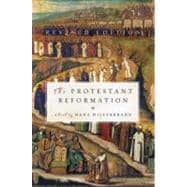
Note: Supplemental materials are not guaranteed with Rental or Used book purchases.
Purchase Benefits
What is included with this book?
The New copy of this book will include any supplemental materials advertised. Please check the title of the book to determine if it should include any access cards, study guides, lab manuals, CDs, etc.
The Used, Rental and eBook copies of this book are not guaranteed to include any supplemental materials. Typically, only the book itself is included. This is true even if the title states it includes any access cards, study guides, lab manuals, CDs, etc.
Chapter One
The Grievances (Gravamina) of the German People (1521)
Grievances, or complaints, were part of the late medieval political scene, which vested representative bodies with the power and authority to lodge formal complaints in order to redress abuses.
A first such set of grievances was formulated at the Council of Constance (1414–1418) under eighteen headings. This was done with the endorsement of the German higher clergy, an indication, it would seem, that these grievances were directed not so much against the church as against the papacy and Rome. Subsequently, such "gravamina" were periodically voiced by German diets, or legislatures. In 1510, Emperor Maximilian I instructed the humanist Jakob Wimpfeling to draft a list of grievances. In a list published in 1519, Wimpfeling warned of the German church's widespread unhappiness with the burdens placed on it by Rome. Two years later, when the new emperor, Charles V, sought the concurrence of the German diet to condemn Martin Luther, the diet responded by presenting a new version of Wimpfeling's document. A portion of this document is reprinted here.
13. Concerning Regulations of the Papal Chancery. These regulations are made for the benefit and advantage of Roman courtiers, and often changed or reinterpreted so as to allow the transfer of ecclesiastical benefices, especially in Germany, into Roman hands and to compel us to buy back or lease these benefices from Rome. This is against both statutory law and equity.
18. Concerning the Pope's Prevention of the Elections of Prelates. The pope also seeks to prevent, according to his pleasure, in these cathedral churches the election of bishops, priors, deans, etc. When a bishop is duly elected according to canon law, he replaces him (through confirmation by the consistory) and burdens the elected bishop from Germany with excessive financial charges and taxes.
19. Concerning Papal Dispensation and Absolution. Also, popes and bishops reserve to themselves the absolution from certain sins and cases from which, they say, only they can grant absolution. When such a "case" occurs, the Âpeople are not granted absolution unless much money changes hands. No dispensation is issued unless a great amount of money is paid. And if a poor man cannot pay, he will not receive the dispensation. Certain rich individuals, however, will receive letters of indulgence from his holiness the pope dealing with murder, perjury or some like misdeed to be committed at some future date. Any outrageous priest will then grant absolution. Thus money and the love of money becomes the cause of great vice and sin.
20. Concerning the Ravages of Papal Courtiers. Germans also suffer much from the greed of papal courtiers. When ecclesiastical benefices in a principality fall vacant, honorable senior clergy, who have properly occupied their benefices for several years, are cited by these courtiers to appear in Rome. There they are subjected to humiliating chicaneries and are coerced to make annual payments to these courtiers in line with certain statutes, cited by these courtiers, called Chancery Rules, newly revised. In this way, honorable older clerics, ignorant of the bureaucrats' cunning, are deprived of their benefices. They also thereby defraud the donors, for if one dies, his will would not be honored.
21. Many Benefices Are Acquired Under the Pretext of Papal Family Relations. Also, splendid and good benefices frequently come through the doings of officials, relatives, or courtiers of the pope to incompetent, bad, and ignorant individuals. They gain the right to hold offices "provisionally," or through "regression," "reservation," "pension," or "incompatibility." This causes these benefices to become less attractive and decline in importance, more and more remain attached to the papal court, will not soon fall vacant. Worship is made impossible and the will of the donor is inappropriately dishonored.
22. Concerning Indulgences. It is also most objectionable that His Holiness allows so many indulgences to be sold in the German nation. The poor, simple people are thereby misled and cheated out of their savings. When His Holiness sends nuncios and ambassadors to a country, he empowers them to offer indulgences, from which they retain a portion of the income for their expenses and wages. At one time, indulgences were sold for Rome in the hope to make a greater profit, as merchants are wont to do. Bishops and secular authorities, who are astute, also receive a share for their assistance. All this is obtained from poor and simple people with cunning.
28. How Much Reform Is Needed. Thus, the poor Christian believers experience much eternal damnation, and the German nation is financially drained, as is easily seen daily in the spiritual leader. It is highly necessary that, therefore, amelioration and reform of our nation are undertaken in order to prevent further decline and damnation of our land. Therefore, we beseech our imperial majesty most urgently to render support for further reform.
The Protestant Reformation
Excerpted from The Protestant Reformation by Hans J. Hillerbrand
All rights reserved by the original copyright owners. Excerpts are provided for display purposes only and may not be reproduced, reprinted or distributed without the written permission of the publisher.